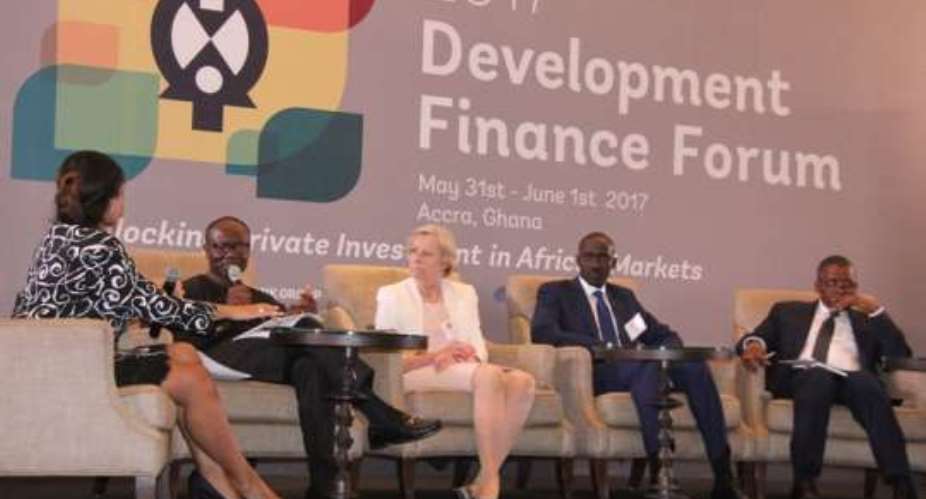Accra, May 31, GNA - Renowned business gurus and politicians at a panel discussion at the Third World Bank Development Finance Forum, in Accra, have agreed that energy is the main challenge to Africa's rapid socio-economic development and transformation.
They stated that the solution to Africa's energy challenge was the responsibility of both Governments and the private sector.
They are Mr Ken Ofori-Atta, Ghana's Finance Minister ; Mr Joaquim Levy, World Bank Group Managing Director and Chief Financial Officer; Mr Aliko Dangote, the Chairman and Chief Executive Officer of Dangote Group ; Mr Abdourahmane Cisse, Budget Minister of the Ivory Coast; and Mrs Helen Tarnoy, Managing Director, Aldwych International Limited.
The panelists are of the view that regional integration would play a very critical role in addressing the continent's energy needs and they are optimistic that harnessing the continent's renewable natural resources, such as the abundant sunlight for energy generation would serve the purpose.
According to the World Bank, in Africa today, more than 500 million people live without electricity.
In fact, fewer than one in five Africans was connected to the power grid in 2012, and despite a modest increase from 32 per cent to 35 per cent between 2010 and 2012, the rate of electrification continues to be too slow to keep pace, with the rapid population growth on the continent.
Mr Ofori-Atta said energy was crucial for a nation's socio-economic development so Ghana was supplying power to her neighbouring countries.
He said integration was a real issue because whatever happened to a country would have repercussions Mr Dangote, for his part, stated that the energy generation capacity of 48 Sub-Saharan Africa countries with a population of one billion, was equal to that of Spain, which had a population of 46 million.
He said for Africa to develop, there was the need for adequate power generation to facilitate the growth of industries.
He said despite the fact that 65 per cent of the world's arable lands were in Africa; the continent still imported huge tonnes of cereals, such as rice annually.
He said the Dangote Group, as part of efforts to address the poverty situation on the continent, would be providing assistance to maize farmers.
'My own dream is that both the private sector and the public sector would team up to get our people out of poverty,' Mr Dangote stated.
Mrs Tarnoy also said a vibrant informal sector of the economy would support the growth of the formal sector.
Mr Cisse stated that over the past few years the Ivory Coast had increased its energy generation by 40 per cent and as part of enhancing regional integration, they were exporting power to their neighbouring countries.
He said one of the critical issues facing the continent was demography; explaining that creating jobs for the teeming unemployed youth was a very big challenge.
Mr Levy, however, said the World Bank was hopeful that extreme poverty would be eliminated by 2030.
The forum, the maiden one to be organised by the World Bank in Africa, brought together public and private sector leaders from around the world to explore innovative approaches to radically increase private sector investment in Africa's priority sectors.
President Nana Addo Dankwa Akufo-Addo opened the forum, which is being attended by 300 participants.
It aims to contribute to the development of a pipeline of projects and programmes by offering a pre-investments platform for the public and private sectors to explore market-building alliances and opportunities.
This year's event focuses on critical sectors of Africa such as Infrastructure, Agribusiness, Manufacturing and Technology.
GNA
By Iddi Yire/Doris Ablordey, GNA





 Lay KPMG audit report on SML-GRA contract before Parliament – Isaac Adongo tells...
Lay KPMG audit report on SML-GRA contract before Parliament – Isaac Adongo tells...
 Supervisor remanded for stabbing businessman with broken bottle and screwdriver
Supervisor remanded for stabbing businessman with broken bottle and screwdriver
 NDC watching EC and NPP closely on Returning Officer recruitment — Omane Boamah
NDC watching EC and NPP closely on Returning Officer recruitment — Omane Boamah
 Your decision to contest for president again is pathetic – Annoh-Dompreh blasts ...
Your decision to contest for president again is pathetic – Annoh-Dompreh blasts ...
 Election 2024: Security agencies ready to keep peace and secure the country — IG...
Election 2024: Security agencies ready to keep peace and secure the country — IG...
 People no longer place value in public basic schools; new uniforms, painting wil...
People no longer place value in public basic schools; new uniforms, painting wil...
 'Comedian' Paul Adom Otchere needs help – Sulemana Braimah
'Comedian' Paul Adom Otchere needs help – Sulemana Braimah
 Ejisu by-election: Only 33% of voters can be swayed by inducement — Global InfoA...
Ejisu by-election: Only 33% of voters can be swayed by inducement — Global InfoA...
 Minority will expose the beneficial owners of SML, recover funds paid to company...
Minority will expose the beneficial owners of SML, recover funds paid to company...
 Prof. Opoku-Agyemang has ‘decapitated’ the NPP’s strategies; don’t take them ser...
Prof. Opoku-Agyemang has ‘decapitated’ the NPP’s strategies; don’t take them ser...
